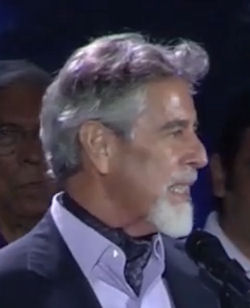Francisco Sagasti
 On 17 November 2020 Peru’s Congress chose legislator Francisco Sagasti as the Andean country’s caretaker president, in an attempt to defuse a sharp political crisis after angry protests and the departure of two presidents in the past week. The 76-year-old Sagasti, from the centrist Morado Party, won enough votes to head Congress. This meant he will assume the presidency of Peru before national elections called for April. Sagasti, a former World Bank official and engineer, faced a formidable challenge to bring stability to Peru, which was already hard hit by COVID-19 and heading for its worst economic contraction in a century.
On 17 November 2020 Peru’s Congress chose legislator Francisco Sagasti as the Andean country’s caretaker president, in an attempt to defuse a sharp political crisis after angry protests and the departure of two presidents in the past week. The 76-year-old Sagasti, from the centrist Morado Party, won enough votes to head Congress. This meant he will assume the presidency of Peru before national elections called for April. Sagasti, a former World Bank official and engineer, faced a formidable challenge to bring stability to Peru, which was already hard hit by COVID-19 and heading for its worst economic contraction in a century.
After the vote, he walked out of Congress with security guards and crossed the police lines to get close to a group of protesters who were outside the building waiting to hear the news of who would be the next president of Peru. He waved at them and they waved back. It’s a sign that he is telling young people, ‘I am with you.’ Crowds in Lima’s central plaza greeted his appointment with jubilee. He was also immediately welcomed by international leaders including Organization of American States Secretary-General Luis Almagro.
Francisco Sagasti is professor at the Pacífico Business School of the Universidad del Pacífico; senior researcher emeritus and former Executive Director of FORO Nacional Internacional, a independent think-tank; and advisor to private corporations, international organizations, foundations and public sector agencies on strategy issues. In 2017 he won the Robert K Merton award of the International Sociological Association for distinguished contributions to the social studies of science. Dr. Sagasti has been chairman of the Board of the Science and Technology Program at the Prime Minister’s Office in Peru; member of the Board of Governors of the Canadian International Development Research Centre (IDRC), of the International Advisory Board of the Lemelson Foundation; and of the International Institute for Environment and Development (IIED); Director of the Agenda: PERÚ program at FORO Nacional Internacional; Chief of the Strategic Planning Division and Senior Advisor at the World Bank; chairman of the United Nations Advisory Committee on Science and Technology for Development; Silberberg visiting professor at the Wharton School of Finance, University of Pennsylvania, visiting professor at the University for Peace in Costa Rica and at the Instituto de Empresa in Madrid; and associate researcher at the Institute of Development Studies, University of Sussex.
Francisco Sagasti holds engineering degrees from the National Engineering University in Lima, Peru, an MSc in industrial engineering from Penn State University, and a Ph.D. in operations research and social systems sciences from the University of Pennsylvania. He has been visiting lecturer at universities in the United States, Europe and developing regions. In Peru Dr. Sagasti has been founder and executive director of GRADE, a policy-oriented think tank; advisor to the ministers of Foreign Affairs, Education, Industry and the Prime Minister; advisor to the Chief of the National Planning Institute and member of the Board of the National Council for Science and Technology; and has taught at the Universidad del Pacífico and the Pontificia Universidad Católica del Perú; and has been consultant to numerous private, public and civil society organizations. He recently received the Robert K. Merton Award of the International Sociological Association for his academic and professional achievements, and previously received the Paul Hoffman Award created in memory of the administrator of the Marshall Plan and first Executive Director of the United Nations Development Programme.
Sagasti has published more than 25 books including: Looking back to move forward: a 40 year retrospective of the STPI project, Lima, FORO Nacional Internacional, 2015; Ciencia, Tecnología, Innovación: Políticas para América Latina, Lima/Mexico, Fondo de Cultura Económica, 2011 (2013); Power, Purse and Numbers: A Diagnostic Study of the UN Budget and Finance Process and Structure (with Ursula Casabonne and Fernando Prada), Stockholm, The Four Nations Initiative, October 2007; The Future of Development Financing: Challenges and Strategic Choices (with K. Bezanson and F. Prada), London, Palgrave McMillan, 2005; Knowledge and Innovation for Development: The Sisyphus Challenge of the 21st Century, Cheltenham, Edward Elgar, 2004; Financing and Providing Global Public Goods: Expectations and Prospects (with K. Bezanson), Stockholm, Ministry for Foreign Affairs, 2001; Democracy and Good Government (with Pepi Patrón, Max Hernández and Nicolás Lynch), third edition, Lima, Editorial APOYO/Agenda: PERÚ, 2001; Development Cooperation in a Fractured global Order (with G. Alcalde), Ottawa, IDRC, 1999; He coordinated the publication of Development Strategies for the 21st Century: the case of Peru, Lima, Peru Report, 2001 (second edition, 2014); and edited (with Céline Sachs and Jean-Jacques Salomon) The Uncertain Quest: Science, Technology and Development, Tokyo, United Nations University Press, 1994.
He is also the author of more than 150 papers and book chapters, contributes frequently to newspapers and magazines in Lima, Peru, has been member of the Editorial Boards of Foresight, World Development, Technological Forecasting and Social Change and El Trimestre Económico. He has also directed a nine-part TV series Abriendo Caminos on social and economic change in Peru.
|
NEWSLETTER
|
|
Join the GlobalSecurity.org mailing list
|
|
|